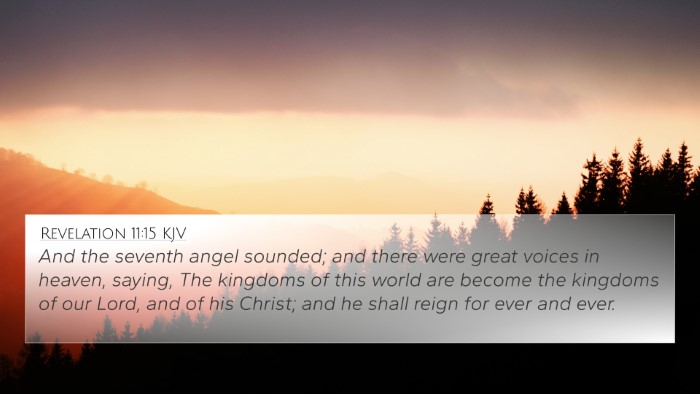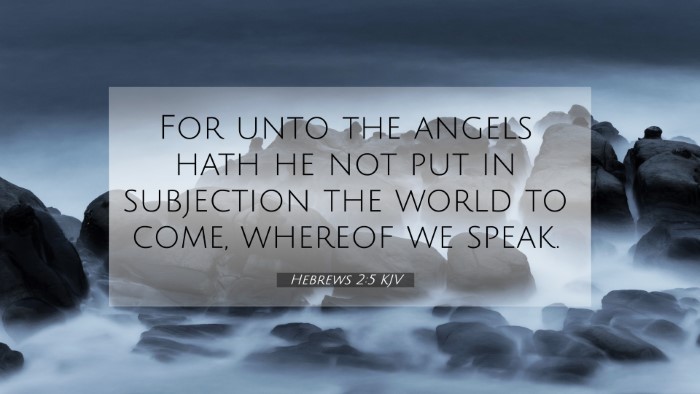Old Testament
Genesis Exodus Leviticus Numbers Deuteronomy Joshua Judges Ruth 1 Samuel 2 Samuel 1 Kings 2 Kings 1 Chronicles 2 Chronicles Ezra Nehemiah Esther Job Psalms Proverbs Ecclesiastes Song of Solomon Isaiah Jeremiah Lamentations Ezekiel Daniel Hosea Joel Amos Obadiah Jonah Micah Nahum Habakkuk Zephaniah Haggai Zechariah MalachiHebrews 2:5 Similar Verses
Hebrews 2:5 Cross References
For unto the angels hath he not put in subjection the world to come, whereof we speak.
Uncover the Rich Themes and Topics of This Bible Verse
Listed below are the Bible themes associated with Hebrews 2:5. We invite you to explore each theme to gain deeper insights into the Scriptures.
Hebrews 2:5 Cross Reference Verses
This section features a detailed cross-reference designed to enrich your understanding of the Scriptures. Below, you will find carefully selected verses that echo the themes and teachings related to Hebrews 2:5 KJV. Click on any image to explore detailed analyses of related Bible verses and uncover deeper theological insights.

2 Peter 3:13 (KJV) »
Nevertheless we, according to his promise, look for new heavens and a new earth, wherein dwelleth righteousness.

Revelation 11:15 (KJV) »
And the seventh angel sounded; and there were great voices in heaven, saying, The kingdoms of this world are become the kingdoms of our Lord, and of his Christ; and he shall reign for ever and ever.
Hebrews 2:5 Verse Analysis and Similar Verses
Understanding Hebrews 2:5
Verse Reference: Hebrews 2:5 - "For unto the angels hath he not put in subjection the world to come, whereof we speak."
Summary of Hebrews 2:5
This verse highlights the distinction between the authority of angels and the authority given to humanity, particularly in the context of the coming world or age. It indicates that the future dominion over the world that is to come is not entrusted to angels but to humanity, which sets the stage for a deeper understanding of the roles assigned to both in God's redemptive plan.
Commentary Insights
Matthew Henry's Commentary
Matthew Henry emphasizes that God has reserved the world's future governance for human beings rather than angels. He notes that this emphasizes the dignity of mankind and the honor bestowed upon those who believe in Christ. Henry also connects this theme with the ongoing narrative of God's sovereignty and purpose in history.
Albert Barnes' Notes
Albert Barnes points out that the reference to "the world to come" signifies an eschatological context, stressing the transition from the current age to the age to come where believers will share in Christ's authority. Barnes elaborates on the fact that while angels serve important roles, their dominion does not extend to the future world which is promised to believers in Christ.
Adam Clarke's Commentary
Adam Clarke discusses how Hebrews 2:5 indicates a purpose of redemption that is specifically human-centric. Clarke argues that it is essential to understand this verse in light of the broader message of salvation and the significance of Christ’s incarnation, which makes humanity exalted heirs alongside Him in the coming age.
Bible Verse Cross-References
- Psalm 8:4-6 - These verses reflect the glory and honor given to humanity, echoing the theme of their future authority.
- 1 Corinthians 6:3 - Paul indicates that believers will judge angels, reaffirming human authority in the coming age.
- Revelation 21:1-4 - This passage describes the new heaven and earth, highlighting the full realization of God's promises.
- Matthew 28:18 - Jesus declares that all authority in heaven and on earth has been given to Him and, by extension, His followers.
- Ephesians 1:20-22 - These verses illustrate Christ's headship over all things, including the church, relevant for understanding human authority under Christ.
- Colossians 3:4 - Paul notes that believers' lives are hidden with Christ in God, indicating future glory with Him.
- Romans 8:19-21 - The creation eagerly awaits the revelation of the sons of God, aligning with the theme of human governance in the future world.
Thematic Connections
This verse fosters a rich inter-biblical dialogue that connects various significant themes. It aligns with the exaltation of humanity in relation to God's plan and underlines the importance of understanding biblical hierarchy and authority.
- Redemption and Authority: The verse connects with the theme of redemption, pointing to humanity's restored role through Christ.
- The Role of Angels: It raises a discussion about angelic beings and their functions within God's created order.
- Eschatology: Insights into the future age where believers will reign with Christ.
- Creation's Anticipation: Relating creation's groaning in anticipation for the restoration of order through humanity.
Tools for Bible Cross-Referencing
For those interested in exploring the connections between Bible verses, several tools enhance the study:
- Bible Concordance: A useful resource for locating specific words and themes across different verses.
- Bible Cross-Reference Guide: Guides that summarize related scriptures and themes for deeper understanding.
- Cross-reference Bible Study: Methods to compare and study scriptures that are interrelated or expand on each other.
- Bible Reference Resources: Comprehensive materials that aid in finding and understanding cross-references.
Conclusion
In summary, Hebrews 2:5 not only expresses a theological truth regarding humanity's forthcoming authority but also serves as a bridge to valuable insights derived from various commentaries. By engaging with this verse, believers can explore deeper themes of redemption, authority, and eschatology, establishing vital connections throughout Scripture. Utilizing cross-referencing tools effectively allows for an enriched understanding of how themes echo throughout the Bible, paving the way for comprehensive Bible verse analysis.



